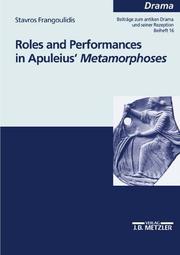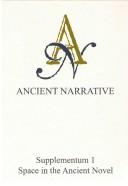| Listing 1 - 10 of 22 | << page >> |
Sort by
|
Digital
ISBN: 9783110210033 9783110205947 Year: 2008 Publisher: Berlin ;; Boston De Gruyter
Abstract | Keywords | Export | Availability | Bookmark
 Loading...
Loading...Choose an application
- Reference Manager
- EndNote
- RefWorks (Direct export to RefWorks)

ISBN: 3476452840 9783476452849 3476028410 Year: 2001 Volume: 16. Publisher: Stuttgart: J. B. Metzler,
Abstract | Keywords | Export | Availability | Bookmark
 Loading...
Loading...Choose an application
- Reference Manager
- EndNote
- RefWorks (Direct export to RefWorks)
Latin fiction --- Metamorphosis in literature. --- Mythology, Classical, in literature --- Theater --- Roman latin --- Métamorphose dans la littérature --- Mythologie ancienne dans la littérature --- Théâtre --- History and criticism. --- Histoire et critique --- Apuleius. --- Mythology, classical, in literature. --- Narration (Rhetoric) --- Mythology, Classical, in literature. --- Performing arts in literature. --- Role playing in literature. --- Rhetoric, Ancient. --- History --- Apuleius --- Knowledge --- Performing arts. --- Métamorphose dans la littérature --- Mythologie ancienne dans la littérature --- Théâtre --- Metamorphosis in literature --- Performing arts in literature --- Rhetoric, Ancient --- Role playing in literature --- Ancient rhetoric --- Classical languages --- Greek language --- Greek rhetoric --- Latin language --- Latin rhetoric --- Rhetoric --- Apulien --- Apulée --- Apuleius Madaurensis --- Appuleius, Lucius --- Apuleius, Lucius --- Apuleio --- Apuleyo, Lucio --- Abūliyūs, Lūkiyūs --- Apuleius, --- Apuleius Platonicus Madaurensis --- Apuleu --- אפוליאוס --- לוקיוס, אפוליאוס --- ابوليوس --- Appuleius, --- Apuleius Barbarus --- Apulejus, Lucius --- Lucio Apuleio --- Apuleyo de Madauros --- Appuleius --- Discourse analysis, Narrative --- Narratees (Rhetoric) --- Latin fiction - History and criticism. --- Theater - Greece. --- Apuleius. - Metamorphoses.
Book
ISBN: 3476451844 Year: 1997 Publisher: Stuttgart M und P
Abstract | Keywords | Export | Availability | Bookmark
 Loading...
Loading...Choose an application
- Reference Manager
- EndNote
- RefWorks (Direct export to RefWorks)
Drama --- Latin drama (Comedy) --- Literary form --- Theater --- Technique --- History and criticism --- History

ISBN: 9080739022 9491431005 9789491431005 9789080739024 Year: 2002 Publisher: Groningen : Barkhuis Publishing & The University Library Groningen,
Abstract | Keywords | Export | Availability | Bookmark
 Loading...
Loading...Choose an application
- Reference Manager
- EndNote
- RefWorks (Direct export to RefWorks)
This special issue of Ancient Narrative Supplementum 1, entitled 'Space in the Ancient Novel', brings together a collection of revised papers, originally presented at the International conference under the same title organized by the Department of Philology (Division of Classics) of the University of Crete and held in Rethymnon, on May 14-15, 2001. This conference inaugurated what is hoped to become a new series of biennial International meetings on the Ancient Novel (RICAN, Rethymnon International Conferences on the Ancient Novel) which aspires to continue the reputable tradition of the Groni
Book
ISBN: 9783110205947 3110205947 128339703X 9786613397034 3110210037 9783110210033 6613397032 Year: 2008 Volume: 2 Publisher: Berlin ; New York Walter de Gruyter
Abstract | Keywords | Export | Availability | Bookmark
 Loading...
Loading...Choose an application
- Reference Manager
- EndNote
- RefWorks (Direct export to RefWorks)
This is the first in-depth study of Apuleius' Metamorphoses to look at the different attitudes characters adopt towards magic as a key to deciphering the complex dynamics of the entire work. The variety of responses to magic is unveiled in the narrative as the protagonist Lucius encounters an assortment of characters, either in embedded tales or in the main plot. A contextualized approach illuminates Lucius' relatively good fortune when compared to other characters in the novel - this results from his involvement with the magic of a sorcerer's apprentice, rather than that of a real witch, and signals the possibility of eventual salvation. A careful investigation of Lucius' attitude towards Isis in book 11 and his relationship with the witch-slave girl Photis earlier on suggests that the novel's final book may be read as a second "Metamorphoses", consciously rewritten from a positive perspective. Last but not least, the book also breaks new ground by examining the narrative structure of the Metamorphoses against the background of the typical plotline found in the ideal romance. The comparison shows how Apuleius both follows and alters this plot, exploiting the genre to his own specific ends, in keeping with his central theme of metamorphosis.
Magic in literature. --- Magie dans la littérature --- Apuleius. --- Apuleius -- Madaurensis. -- Metamorphoses. --- Apuleius. -- Metamorphoses. --- Apuleius. Metamorphoses. --- Witches in literature. --- Ancient Magic. --- Ancient Novel. --- Genre. --- Isis. --- Narrative. --- Apulée (0125?-0180?). Les métamorphoses --- Magie --- Dans la littérature
Book
ISBN: 9077922032 9491431390 Year: 2005 Volume: 4 Publisher: Eelde Groningen Barkhuis Publishing Groningen University Library
Abstract | Keywords | Export | Availability | Bookmark
 Loading...
Loading...Choose an application
- Reference Manager
- EndNote
- RefWorks (Direct export to RefWorks)
This thematic fourth Supplementum to Ancient Narrative, entitled Metaphor and the Ancient Novel, is a collection of revised versions of papers originally read at the Second Rethymnon International Conference on the Ancient Novel (RICAN 2) under the same title, held at the University of Crete, Rethymnon, on May 19-20, 2003.Though research into metaphor has reached staggering proportions over the past twenty-five years, this is the first volume dedicated entirely to the subject of metaphor in relation to the ancient novel. Not every contributor takes into account theoretical discussions of metap
Classical fiction --- Metaphor in literature. --- Metaphor in literature --- History and criticism.
Book
ISBN: 9783110715415 3110715414 9783110715811 3110715813 3110715848 Year: 2021 Publisher: Berlin : De Gruyter,
Abstract | Keywords | Export | Availability | Bookmark
 Loading...
Loading...Choose an application
- Reference Manager
- EndNote
- RefWorks (Direct export to RefWorks)
Ambiguity in the sense of two or more possible meanings is considered to be a distinctive feature of modern art and literature. It characterizes the "open artwork" (Eco) and is generated by "disruptive tactics" (Wellershoff) and strategies to engender uncertainty. While ambiguity is seen as a "paradigm of modernity" (Bode), there is skepticism regarding its use in the pre-modern era. Older studies were dominated by the conviction that there was a lack of ambiguity in pre-modernity because, according to the rules of the "old rhetoric", ambiguity was seen as an avoidable error (vitium) and a violation of the dictate of clarity (perspicuitas). The aim of the volume is to re-examine the putative "absence of ambiguity" in the pre-modern era. Is it not possible to find clear examples of deliberately employed (intended) ambiguity in antiquity? Are the oracles and riddles, the Palinode of Stesichoros and Socrates (Phaedrus), the dissoi logoi of rhetoric, the ambiguities of the tragedies all exceptions or do they not indicate a distinct interest in the artistic use of ambiguity? The presentations of the conference, which will include scholars from various philologies, will combine a recourse to theoretical concepts of intended ambiguity with exemplary analyses from the field of pre-modern art and literature.
Letteratura greca. --- Literature, Ancient --- History and criticism
Book
Year: 2005 Publisher: Groningen : Barkhuis : Groningen University Library,
Abstract | Keywords | Export | Availability | Bookmark
 Loading...
Loading...Choose an application
- Reference Manager
- EndNote
- RefWorks (Direct export to RefWorks)
Metaphor in literature. --- Greek fiction --- Latin fiction --- History and criticism.
Book
ISBN: 9783111340944 Year: 2023 Publisher: Berlin Boston
Abstract | Keywords | Export | Availability | Bookmark
 Loading...
Loading...Choose an application
- Reference Manager
- EndNote
- RefWorks (Direct export to RefWorks)
Book
ISBN: 9783110455571 3110455579 3110455587 3110456508 3110580683 9783110456509 9783110455588 Year: 2016 Volume: 34 Publisher: Berlin: Walter de Gruyter,
Abstract | Keywords | Export | Availability | Bookmark
 Loading...
Loading...Choose an application
- Reference Manager
- EndNote
- RefWorks (Direct export to RefWorks)
Roman plays have been well studied individually (even including fragmentary or spurious ones more recently). However, they have not always been placed into their ‘context’, though plays (just like items in other literary genres) benefit from being seen in context. This edited collection aims to address this issue: it includes 33 contributions by an international team of scholars, discussing single plays or Roman dramatic genres (including comedy, tragedy and praetexta, from both the Republican and imperial periods) in contexts such as the literary tradition, the relationship to works in other literary genres, the historical and social situation, the intellectual background or the later reception. Overall, they offer a rich panorama of the role of Roman drama or individual plays in Roman society and literary history. The insights gained thereby will be of relevance to everyone interested in Roman drama or literature more generally, comparative literature or drama and theatre studies. This contextual approach has the potential of changing the way in which Roman drama is viewed.
Latin drama --- History and criticism. --- History and criticism --- Latin drama - History and criticism --- Drama. --- Roman literature. --- comedy. --- tragedy.
| Listing 1 - 10 of 22 | << page >> |
Sort by
|

 Search
Search Feedback
Feedback About UniCat
About UniCat  Help
Help News
News